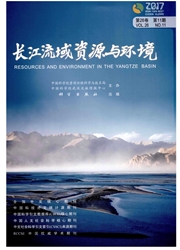

 中文摘要:
中文摘要:
从农户满意度绩效出发,在理论分析基础上提出相关研究假说,并基于全国率先探索耕地保护基金的成都市的实地调研数据,利用ordered probit模型,实证检验了耕地保护补贴流向对耕地保护经济补偿政策农户满意度的影响。研究结果表明:(1)转出土地的农户比转入土地或未流转土地的农户对耕地保护经济补偿政策有更高的满意度。土地转出行为使农民对补偿政策“非常不满意”、“不满意”和“一般”的概率分别下降0.3%、4.8%和11%,并使农民对补偿政策“满意”和“非常满意”的概率分别上升14.4%和1.7%。(2)土地转入行为则使农民对补偿政策“非常不满意”、“不满意”和“一般”的概率分别上升9.3%、35.4%和0.7%,并使农民对补偿政策“满意”和“非常满意”的概率分别下降42.9%和2.6%。为提高耕地保护经济补偿政策农户满意度绩效,政府应合理分配有限的耕地保护补贴资金,补贴资金应优先向土地转入户倾斜,提高实际上在承担耕地保护责任的土地转入户保护耕地的积极性。
 英文摘要:
英文摘要:
From the perspective of peasant household' satisfaction and on the basis of theoretical analysis, we put forward a hypothesis. Based on the field survey data of Chengdu which takes the lead in exploring the cultivated land protection fund, we used the ordered probit model to test how the subsidy flow impacts the farmers' satisfaction about the economic compensation for farmland protection policy (ECFP). The results indicate that: (1) The farmers who transferred outward their farmland have higher satisfaction than those who transferred inward their farmland and those who didn't transfer their farmland. If the farmers transfer outward their farmland, the probability of"very dissatisfied", "not satisfied" and "general" that the farmers evaluate about the compensation policy fell by 0.3%, 4.8% and 11%, respectively, and the probability of "satisfaction" and "very satisfied" the farmers evaluate about the compensation policy increased by 14.4% and 1.7%, respectively. (2) If the farmers transfer inward their farmland, the probability of "very dissatisfied", "not satisfied" and "general" that the farmers evaluate about the compensation policy increased by 9.3%, 35.4% and 0.7%, respectively, and the probability of "satisfaction" and "very satisfied" the farmers evaluate about the compensation policy fell by 42.9% and 2.6%, respectively. To improve the farmers' satisfaction performance about the ECFP policy, the government should allocate the limited arable land protection subsidies reasonably. So, subsidies should be given priority to the farmers who transfer inward their farmland and take the responsibility of protecting the arable land actually to improve their motivation about cultivated land protection.
 同期刊论文项目
同期刊论文项目
 同项目期刊论文
同项目期刊论文
 期刊信息
期刊信息
